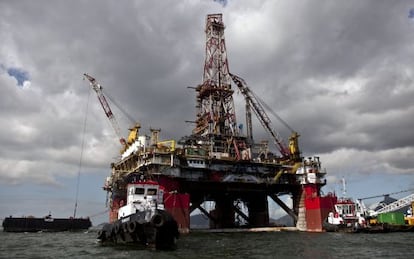Petrobras hikes production by 50 percent to lift it out of crisis
Nine new units should be producing one million additional barrels by next year


Brazil’s state oil company Petrobras, which will mark its 60th anniversary on Thursday, has announced it will increase production by 50 percent in an effort to steer away from the current crisis it is facing.
Nine production units now being installed will pump an additional one million barrels a day beginning next year, said Petrobras CEO María das Graças Foster.
Once ranking third among its global counterparts, Petrobras now comes in 10th on the list of oil industry firms.
Three years after raising around 120 billion reals ($54 billion) in a share issue, Petrobras is now listed at 240 billion reals ($108 billion) on the São Paulo stock market (Bovespa) – half of its value when it was first floated on the Brazilian bourse in 2010 and listed at 453 billion reals ($204 billion).
The reasons behind the decline in its finances vary, and include the current high price for oil. Petrobras purchases expensive fuel that it cannot sell at profit prices in Brazil. President Dilma Rousseff has for now declined to raise gasoline prices because she fears it could hike inflation, which now stands at six percent.
According to estimates made by Vinicius Canheu, a petrochemical analyst at Credit Suisse, for every 10-percent difference between the price of fuel it purchases and what it sells in Brazil, Petrobras loses at least $5.2 billion. For this reason, Petrobras officials and its private investors hope that Rousseff lifts the cap on the price of fuel – an unpopular move she is reluctant to make, especially before next year’s presidential elections in which she is expected to run for a second term.
Rousseff served as energy and mines minister and on the board of the petroleum firm during the previous presidential term of Luiz Inácio Lula da Silva. After she came to office, Rousseff replaced José Sergio Gabrielli, a top official from the ruling Workers' Party (PT), with petroleum engineer María das Graças Foster, as the head of Petrobras – a decision applauded by investors.
But a series of circumstances and perhaps excessive meddling by the government that may have scared off investors has brought Petrobras to its current crisis. Last month there were few participants in Brazil’s first call for auctions for oil company permits in the Libra pre-salt field. In New York last week for the UN General Assembly, Rousseff confided to a group of foreign businessmen that revelations about spying activities by the US National Security Agency (NSA) on the Brazilian government may have frightened away potential investors.
The company has an obligation to ensure that it has at least 30-percent participation in the concessions that will be awarded for drilling in the world’s largest known reserve, which is located in the Santos Basin, about 140 miles off the coast of Rio de Janeiro and situated under a thick layer of salt beneath the South Atlantic seabed.
Despite the current problems, there is hope and optimism that Petrobras’ shares will once again become profitable in the long term. At one period, Petrobras was considered the darling of industry, boosting its profit by 465 percent in 1985.
Today’s investors, analysts say, will have to have patience because in the next 10 years Petrobras will “once again become a highly profitable” venture.
That is the outlook the government is betting on: with the 50 percent increase in its output and the future of the Libra pre-salt field, Petrobras hopes to emerge from its current crisis.
Tu suscripción se está usando en otro dispositivo
¿Quieres añadir otro usuario a tu suscripción?
Si continúas leyendo en este dispositivo, no se podrá leer en el otro.
FlechaTu suscripción se está usando en otro dispositivo y solo puedes acceder a EL PAÍS desde un dispositivo a la vez.
Si quieres compartir tu cuenta, cambia tu suscripción a la modalidad Premium, así podrás añadir otro usuario. Cada uno accederá con su propia cuenta de email, lo que os permitirá personalizar vuestra experiencia en EL PAÍS.
¿Tienes una suscripción de empresa? Accede aquí para contratar más cuentas.
En el caso de no saber quién está usando tu cuenta, te recomendamos cambiar tu contraseña aquí.
Si decides continuar compartiendo tu cuenta, este mensaje se mostrará en tu dispositivo y en el de la otra persona que está usando tu cuenta de forma indefinida, afectando a tu experiencia de lectura. Puedes consultar aquí los términos y condiciones de la suscripción digital.








































